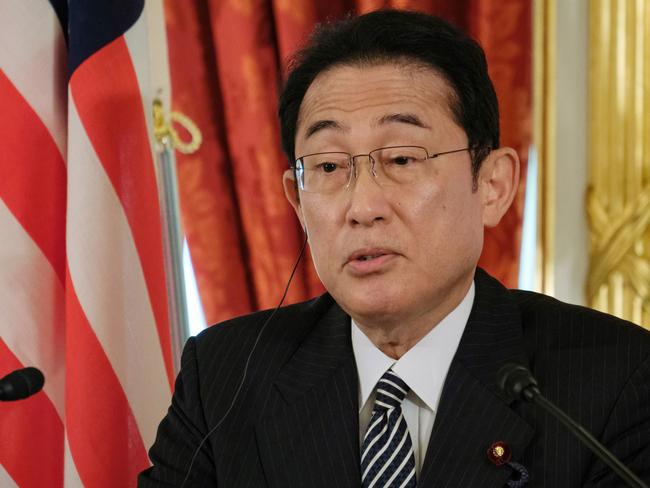Japan scrambles jets as warplanes from China, Russia fly near ‘Quad’ airspace after Taiwan warning
China and Russia flew bombers toward Japan airspace hours after the Quad warned against ‘change by force’, in a ‘planned provocation’ to coincide with the bloc’s first meeting.
World
Don't miss out on the headlines from World. Followed categories will be added to My News.
Japan scrambled fighter jets as warplanes from Russia and China approached its airspace, just hours after Quad nations warned against “change by force” amid the backdrop of tensions with Taiwan.
Chinese and Russian military planes flew jointly over the Sea of Japan and East China Sea as the Quad nations met in Tokyo, in a move the country’s defence minister called “provocative”.
The aircraft, at least two new Chinese bombers and two Russian bombers, hovered over northern Hokkaido to the Noto Peninsula in central Japan.
Leaders of Australia, Japan, India, and the United States had only hours earlier issued a joint statement warning against attempts to “change the status quo by force” as concerns grow about whether China could invade Taiwan.
Beijing and Moscow confirmed the flights, saying they were in line with the Chinese and Russian “annual military co-operation plan”.
Aircraft from South Korea joined Japan in shadowing the jets during the military drill, according to the Russian ministry of defence.
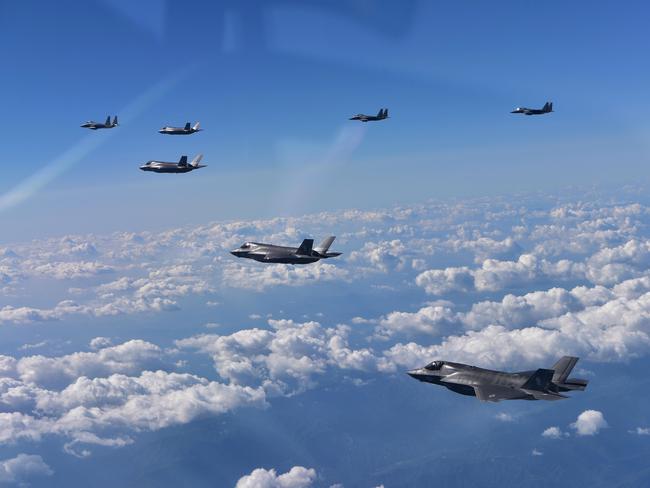
Japanese defence minister Nobuo Kishi said the “joint flight” was likely planned to coincide with the first meeting of Australia’s new PM Anthony Albanese, US president Joe Biden, Indian prime minister Narendra Modi, and Japanese prime minister Fumio Kishida.
“As the international community responds to Russia’s aggression against Ukraine, the fact that China took such action in collaboration with Russia, which is the aggressor, is cause for concern. It cannot be overlooked,” Nobuo Kishi told reporters.
While the Quad bloc’s joint statement against “change by force” made no direct mention of China, it left little doubt its concerns were directed at the Communist country’s growing military power in the region.
The carefully worded document also made reference to the conflict in Ukraine, but without offering any joint position on the Russian invasion, which India has pointedly declined to condemn.
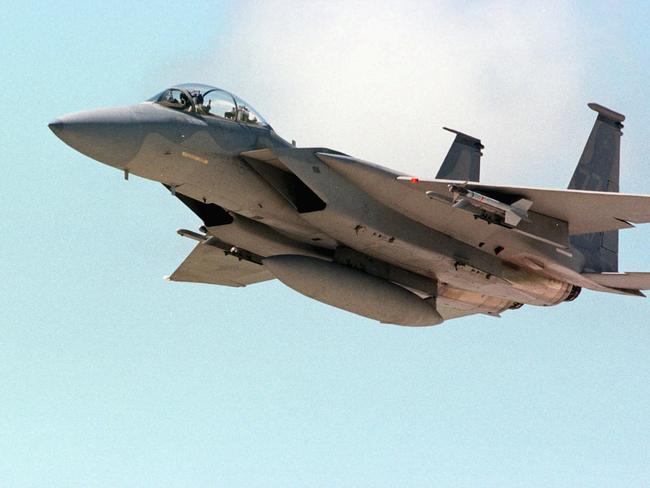
The Quad’s other members have been less coy about their view that a strong response to Russia’s war is needed, one that would deter other countries, including China.
“As Russia’s invasion of Ukraine is shaking the fundamental principles of the international order... (we) confirmed that unilateral attempts to change the status quo by force will never be tolerated anywhere, particularly in the Indo-Pacific region,” Japan’s Prime Minister Fumio Kishida said, using another term for the Asia-Pacific.
The group’s statement made no mention of Russia, or China, but inveighed against a range of activities that Beijing has regularly been accused of in the region.
“We strongly oppose any coercive, provocative or unilateral actions that seek to change the status quo and increase tensions in the area, such as the militarisation of disputed features, the dangerous use of coast guard vessels and maritime militia and efforts to disrupt other countries’ offshore resource exploitation activities,” it said.
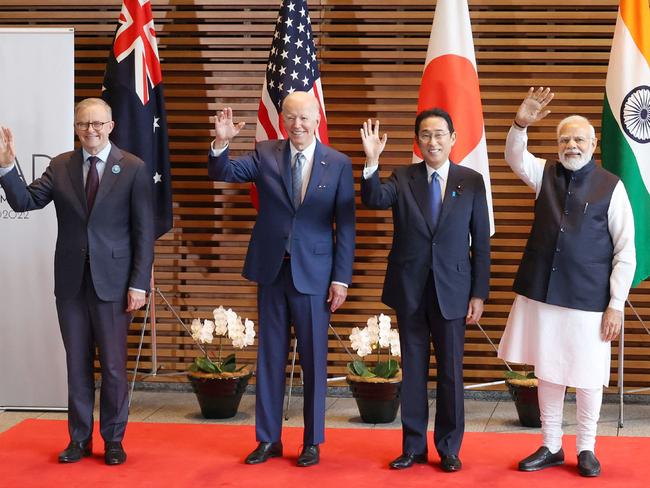
The Quad nations are attempting to build their loose grouping into a more substantive counterweight to China’s rising military and economic power, despite their differences.
They unveiled plans to invest at least $50 billion into regional infrastructure projects over the next five years, and a maritime monitoring initiative seen as intended to bolster surveillance of Chinese activities.
It follows recent efforts by China to build ties with Pacific nations including the Solomon Islands, which signed a security pact with Beijing last month.
China’s foreign minister will this week kick off a visit to a host of Pacific nations including the Solomons, Papua New Guinea, Fiji and Kiribati as well as holding video calls with Micronesia and the Cook Islands, Beijing confirmed Tuesday.
Kishida urged Quad members to “listen carefully” to regional neighbours, including the Pacific Islands, while Australia’s newly elected Prime Minister Anthony Albanese said the bloc needed to “push our shared values in the region at a time when China was clearly seeking to exert more influence”.
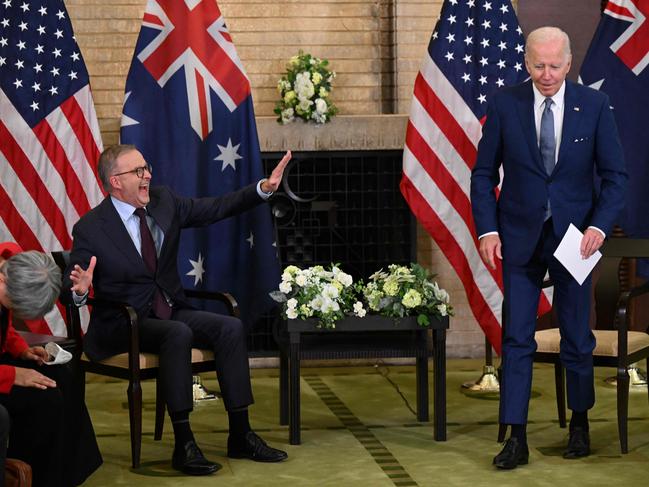
The Quad met a day after China lashed out at Joe Biden’s threat to defend Taiwan, with the White House quickly walking back the US president’s unscripted warning made during the announcement of an economic alliance with Australia.
Mr Biden promised that the US would defend Taiwan militarily if China invaded in what was an unexpected break from the long-running policy of “strategic ambiguity”, which leave’s the US’s position in any conflict purposefully unclear.
Chinese Foreign Ministry spokesman Wang Wenbin accused Washington of playing “word games” on Taiwan, and warned of an “unbearable cost” if the United States “carries on down the wrong path”.
“No one should underestimate the firm resolve, staunch will and strong ability of the Chinese people in defending national sovereignty and territorial integrity, and do not stand against the 1.4 billion Chinese people,” Mr Wenbin said.
Shortly after Mr Biden made the comments, a White House official released a statement to media saying: “There is no change in US policy towards Taiwan. As the president said, our policy has not changed.”
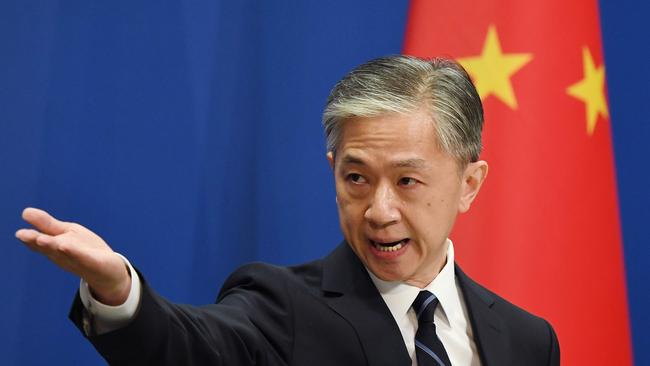
US policy comes under the 1979 Taiwan Relations Act, in which the US is not legally required to militarily defend Taiwan, but is required to ensure Taiwan has the resources to defend itself.
It’s the third time the White House walked back Mr Biden’s comments on Taiwan, and is the latest in a series of statements from the president later reversed by his administration, including his call for regime change in Russia.
Mr Biden made the Taiwan threat at the launch of new Asia-Pacific trade initiative in Tokyo, with 13 countries including India and Japan signing up, although questions about the pact’s effectiveness remain.
Mr Biden formally unveiled the Indo-Pacific Economic Framework for Prosperity, or IPEF, on his second day in Japan, where he had meetings with the Japanese Prime Minister Fumio Kishida and will attend the Quad meeting on Tuesday.
“This framework is a commitment to working with our close friends and partners in the region on challenges that matter most to ensuring economic competitiveness in the 21st century,” he said.
Unlike traditional trade blocs, there is no plan for IPEF members to negotiate tariffs and ease market access – a tool that has become increasingly unpalatable to US voters fearful of seeing homegrown manufacturing undermined.
Instead, the program foresees integrating partners through agreed standards in four main areas: the digital economy, supply chains, clean energy infrastructure and anti-corruption measures.
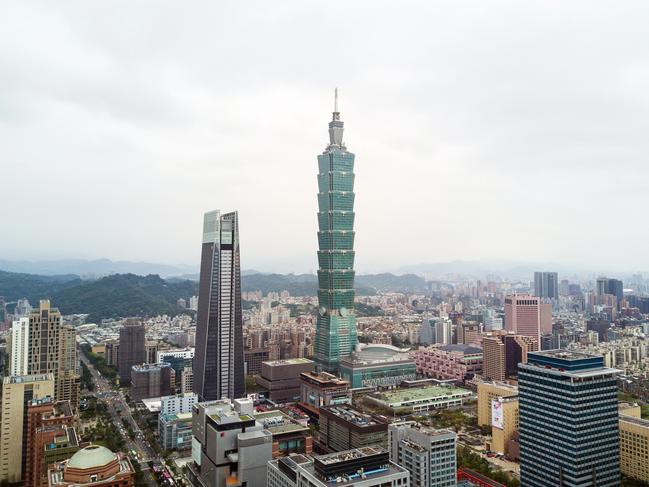
The starting list of members in addition to the United States is Australia, Brunei, India, Indonesia, Japan, Malaysia, New Zealand, the Philippines, Singapore, South Korea, Thailand and Vietnam.
The countries touted IPEF as a framework for what will ultimately become a tight-knit group of trading nations.
“We share a commitment to a free, open, fair, inclusive, interconnected, resilient, secure, and prosperous Indo-Pacific region,” they said in a joint statement.
“Deepening economic engagement among partners is crucial for continued growth, peace, and prosperity.”
China has criticised IPEF as an attempt to create a closed club.
Taiwan, the self-governing democracy that China claims sovereignty over, has pointedly not been brought into the initial line-up – despite being an important link in supply chains for microchips.
It comes as Mr Biden said the United States would defend Taiwan militarily if Beijing invaded the self-ruled island, warning China was “flirting with danger”.
“That’s the commitment we made,” he said when asked if Washington would intervene militarily against a Chinese attempt to forcibly take control of Taiwan, which Beijing considers a renegade province to be unified with the mainland.
“We agreed with the One China policy, we signed on to it … but the idea that (Taiwan) can be taken by force is just not appropriate.
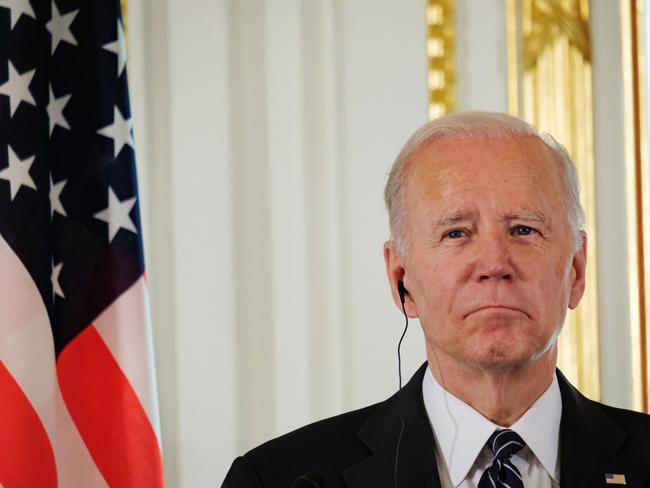
“It will dislocate the entire region and be another action similar to what happened in Ukraine.” In his strongest comments to date on the issue, Mr Biden directly linked the outcome of Western attempts to help Ukraine repel the Russian invasion with lessons likely to be learned in Beijing regarding Taiwan.
It’s “important that [Vladimir] Putin pay a price for his barbarism in Ukraine”, the president said.
“Russia has to pay a long-term price.”
Mr Biden said “this is “not just about Ukraine”, because China is watching to see if Western pressure on Russia slacks off.
“What signal does that send to China about the cost of … attempting to take Taiwan by force?” he asked.
Mr Biden said China does not have “jurisdiction to take Taiwan by force”.
Signalling that he expects an invasion “will not happen”, Mr Biden said however that this “depends … how strong the world makes clear” there would be a price for an invasion.
